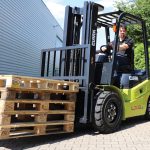Iveco Bus SA leverages customer service excellence
Iveco Bus SA leverages customer service excellence
Although the Covid pandemic pervaded all of 2020, Iveco South Africa’s bus team has enjoyed a successful period, ranking in the top three bus companies by market share for 2020, and culminating in a number one ranking for market share during Q1, 2021.
Despite the pandemic, the bus department has kept up an extensive record of sales in 2021, notes Emir Solapgir, Iveco corporate general manager, Bus SA and RHD Africa, and Head of Bus SA. “As a team, we tried to concentrate on our customer service, which enabled us to increase our sales,” he says.
He adds that part of this strategy was coming up with alternative ways to help Iveco’s customers: “Extensive financial solutions, such as rental, helped us to support our customers through these difficult times and ensure they got their buses.”
Solapgir identifies target orientation, as well as the brilliant Afriway commuter bus product, as key to Iveco’s success. While the pandemic has hit all sectors hard, he says the main handicap for the bus industry has been a reduction in financing support from the banks: “Bus operators are not able to secure financial approval. Unfortunately, the banks in South Africa, as in many other parts of the world, have adopted a very conservative view with respect to financing.”
Despite this, 2021 has brought positive and innovative deals. In March, Iveco delivered a customised bus to the City of Tshwane’s (CoT’s) Fire Department.
The disaster management response unit has been fully operational since mid-March, when training of drivers and medical personnel was completed, explains Jannie Badenhorst, Iveco strategic key account manager.
The unit is designed to respond to disasters and scenarios with a potentially high volume of injuries, including commuter transport accidents, fires, sporting events, and other situations where large crowds gather.
The Afriway 26.28 6×2 with automatic transmission was ordered by Fleet Africa and converted by TFM. “The unit was installed with 12 stretchers and the medical equipment necessary to stabilise high patient volumes at the scene, while it is also equipped with a gurney lift for loading the stretchers,” says Badenhorst, adding that an independent power source ensures that all medical equipment can be operated while driving or when stationary.
Solapgir believes that the high-quality product and Iveco’s first-rate service level were important factors in CoT’s decision, while Badenhorst highlights the versatility of the bus and Iveco’s ability to adapt it to the CoT’s needs: “The 6×2 configuration and additional length allowed more space to accommodate the equipment, while the completely flat floor allows medical personnel to move freely,” he says. “This bus complements the two Iveco Daily isolation ambulances and the armoured Iveco Trakker ambulance/fire truck bought by the City to extract injured people and control fires during public unrest and other potentially dangerous situations.”
Iveco will also soon be launching a facelift for its proven Afriway bus, including a cutting-edge design featuring LED daylights and a three-piece bumper. Solapgir predicts that the market will either remain at the current level or decrease slightly, adding that Iveco’s goal is to increase sales and stay in the top three in terms of bus market share – and the team would like to increase this market share from 9% to 15% in 2021.
Published by
Focus on Transport
focusmagsa




